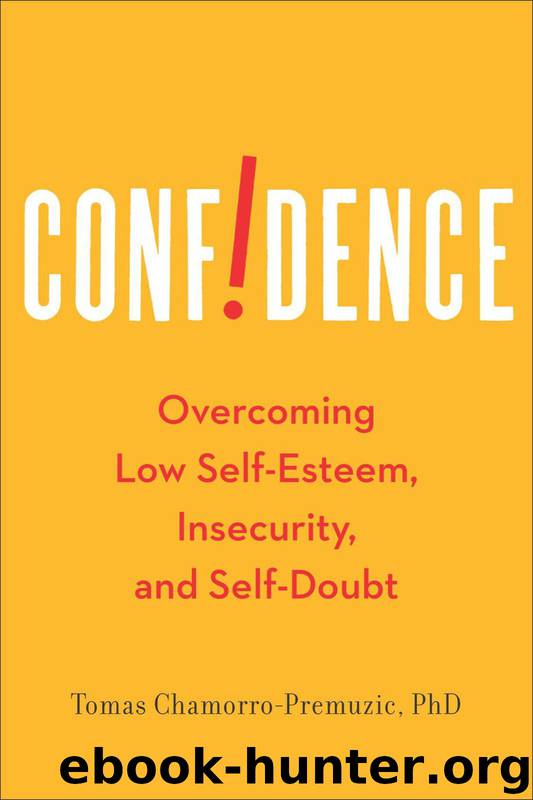Confidence: Overcoming Low Self-Esteem, Insecurity, and Self-Doubt by Tomas Chamorro-Premuzic Ph.D

Author:Tomas Chamorro-Premuzic Ph.D. [Chamorro-Premuzic Ph.D., Tomas]
Language: eng
Format: mobi
Publisher: Penguin Group US
Published: 2013-10-16T14:00:00+00:00
The Adaptive Side of Lower Social Confidence
William James argued that the most fundamental principle governing human behavior is our desire to be appreciated. This principle may be the single most insightful remark about social relations ever formulated. Anywhere in the world, our relationships are driven by a fundamental craving for acceptance and appreciation, and that will always be the case. At the same time, people differ in the degree to which they need acceptance from others, and the less confident you are in your ability to be accepted, the more effort you will make to achieve it. Or, if you prefer, you can reverse the roles. Think of others as the people who are trying to be accepted and liked by you. Now divide “others” into those with high and low confidence. . . . What do you get? Confident people who will work less hard to be accepted by you, and less confident people who are quite motivated to gain your acceptance. Thus William James’s principle explains the inverse association between social confidence and social competence, as well as how lower social confidence can be a driver to produce higher social competence.
Who are the people who crave others’ appreciation the most? The insecure. And what’s the result of craving others’ appreciation? Society. Indeed, any civilization is partly the product of our desire to please others, and it reinforces that desire with rules and norms. A simple quid pro quo or social exchange among its members: If you do something for others they will do something for you; if you are nice to others they will be nice to you. Ultimately, every manifestation of pro-social behavior is an attempt to improve how others see us and what others think of us. When we lack confidence, we feel that our chances of making a favorable impression on others are slim, which means that our social anxiety emerges from our perceived inability or incompetence to gain other people’s affection, respect, and admiration.19 Ultimately, low social confidence can always be interpreted as fear of being rejected or fear of relationship devaluation.
In line, there is a competitive element underlying low social confidence,20 which is elicited in situations that lower people’s confidence in their ability to attain the desired social status from others. Once again, it is easy to see the adaptive side of insecurity, this time in the form of low social confidence. Thus low social confidence is the result of either failing to fulfill your basic affiliation needs—the desire to connect or bond with others—or sensing that you won’t be able to fulfill them. It is a signal that you are not as competent in social interactions as you would like to be, and that others fail to see in you the person you would like to be. Of course, it may be we are overly self-critical in our interpretations of how others see us, and that their views of us are not really that negative. However, it is better to err on the safe side and assume that we are not doing so well.
Download
This site does not store any files on its server. We only index and link to content provided by other sites. Please contact the content providers to delete copyright contents if any and email us, we'll remove relevant links or contents immediately.
Daring Greatly by Brene Brown(6518)
You Do You by Sarah Knight(4470)
Ikigai by Héctor García & Francesc Miralles(4277)
The Confidence Code by Katty Kay(4265)
He's Just Not That Into You by Greg Behrendt & Liz Tuccillo(3902)
The Courage to Be Disliked by Ichiro Kishimi & Fumitake Koga(3507)
Toxic Parents by Susan Forward(3293)
Make Your Bed by William H. Mcraven(3181)
Self-Esteem by Matthew McKay & Patrick Fanning(3145)
365 Days of Wonder by R.J. Palacio(2846)
The Gaslight Effect by Dr. Robin Stern(2796)
The Gifts of Imperfection by Brene Brown(2577)
Dare to Lead by Brené Brown(2462)
The Charisma Myth: How Anyone Can Master the Art and Science of Personal Magnetism by Cabane Olivia Fox(2454)
The Modern Alpha Male: Authentic Principles to Become the Man You Were Born to Be: Attract Women, Win Friends, Increase Confidence, Gain Charisma, Master Leadership, and Dominate Life - Dating Advice by Patrick King(2358)
How to Own Your Own Mind by Napoleon Hill(2299)
Parisian Charm School by Jamie Cat Callan(2293)
The Year of the Introvert by Michaela Chung(2293)
How to Make Small Talk by Melissa Wadsworth(2253)
